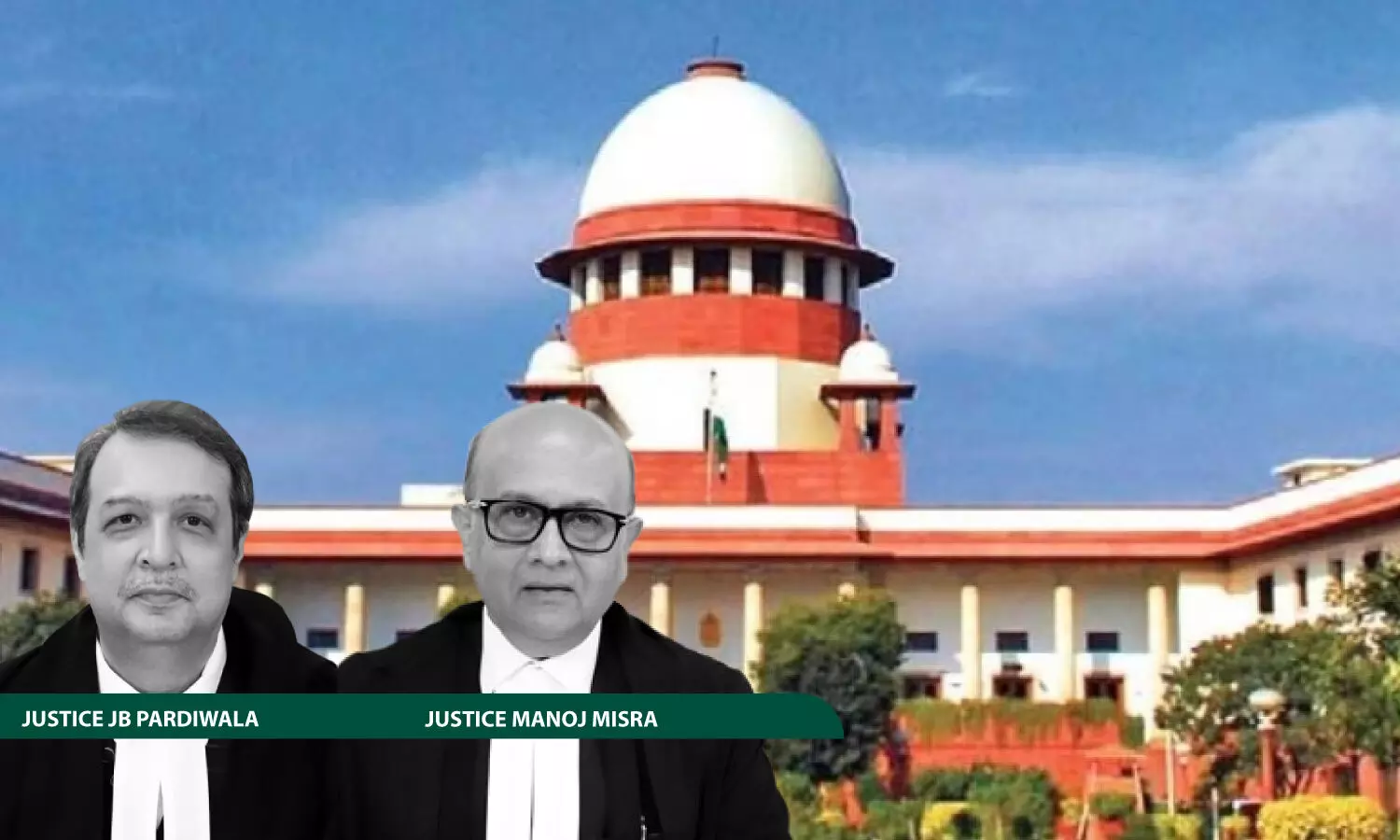
Justice J.B. Pardiwala, Justice Manoj Misra, Supreme Court
Invocation Of Doctrine Of Prospective Overruling To A Decision Must Not Be Resorted To In A Routine Manner: Supreme Court
 |
|The Supreme Court said that if the Doctrine of Prospective Overruling is applied, pending cases would not be affected by the new declaration of law.
The Supreme Court in its recent Judgment, emphasised that the invocation of the Doctrine of Prospective Overruling or the Attribution of Prospectivity to a decision must not be resorted to in a routine manner without the Court satisfying itself that the circumstances demand such a solution.
The Court emphasised thus in Criminal Appeals filed against the Judgment of the Delhi High Court, which rejected the respective Petitions having found no legal infirmity in the Orders of the Trial Court arriving at the conclusion that no offence under Sections 8, 22 and 29, and under Section 8(c) and 22(c) of the Narcotic Drugs and Psychotropic Substances Act, 1985 (NDPS Act) could be said to have been made out since the psychotropic substance in question do not figure in Schedule I of the NDPS Rules, 1985.
The two-Judge Bench comprising Justice J.B. Pardiwala and Justice Manoj Misra observed, “… the invocation of the doctrine of prospective overruling or the attribution of prospectivity to a decision must not be resorted to in a routine manner without the court satisfying itself that the circumstances demand such a solution, both to do complete justice to the matter at hand and also to reorient the law in the right direction without creating widespread chaos and disruption. In certain situations, it might be preferable on a holistic consideration of several competing interests and factors to invoke the doctrine of prospective overruling and therefore, it could be said that the ambit of the doctrine is co-extensive with the equity of a situation.”
The Bench added that if the doctrine of prospective overruling is applied, pending cases would not be affected by the new declaration of law and in the absence of the Court applying this doctrine, however, all pending matters and future cases would automatically and inescapably be governed by the law declared in the overruling decision.
Additional Solicitor General (ASG) Vikramjit Banerjee and AOR Arvind Kumar Sharma appeared for the Appellants while AOR Yash Pal Dhingra appeared for the Respondents.
Court’s Observations
The Supreme Court in view of the facts and circumstances of the case, said, “The judge rather than being the creator of the law, is only its discoverer. Therefore, if a subsequent decision alters or overrules the earlier one, it cannot be said to have made a new law. The correct principle of law is just discovered and applied retrospectively.”
The Court further said that since resorting to the doctrine of “prospective overruling” is an exception to the normal rule that a Judgment or decision applies retrospectively and to the general rule of doctrine of precedent, an express declaration by the Court that its decision is prospectively applicable is absolutely necessary.
“Prospectivity as a concept cannot be considered to be inhered in situations since the intention to attribute prospectivity to a decision must be limpid and clear”, it added.
The Court further remarked that to prevent the chaotic unscrambling of actions done in the past, a middle-ground is reached by postponing the decision declaring invalidity to a particular date, in the interest of doing complete justice and thus, ensuring that “complete justice” is done in the most equitable way is the true essence of the doctrine which is also evident from the fact that the Court has, on several occasions, prescribed the limits to the retroactivity of the law declared by it.
“Time and again, it has been reiterated that prospective overruling is an accepted doctrine as an extended facet of stare decisis. The doctrine involves giving effect to the new law laid down from a prospective date, ordinarily from the date of the judgement of the overruling decision. Sometimes, while declaring that a decision would be prospectively applicable, courts have granted limited relief to the parties or petitioners in question retrospectively”, it noted.
Conclusion
“In light of the elaborate discussion hereinabove, we do not find it necessary, in the facts and circumstances of the matter at hand, to exercise the powers available to us and declare the decision given in Sanjeev V. Deshpande (supra) to be prospectively applicable. We have decided so because there exists no overwhelming reason for us to apply the doctrine of prospective overruling. On the other hand, in order to meet the ends of justice and with a view to ensure that public interest is safeguarded and to give effect to the salutary object behind the enactment of the NDPS Act, the decision must necessarily be retrospectively applicable”, the Court concluded.
The Court was of the view that there is no reason why it should deviate from the default rule of retrospectivity and instead, resort to the doctrine of prospective overruling.
The Court, therefore, directed that the accused persons be tried by the Special Judge and that the Trial Courts shall proceed with the trial and conclude it expeditiously.
Accordingly, the Apex Court allowed the Appeals and set aside the High Court’s Orders.
Cause Title- Directorate of Revenue Intelligence v. Raj Kumar Arora & Ors. (Neutral Citation: 2025 INSC 498)